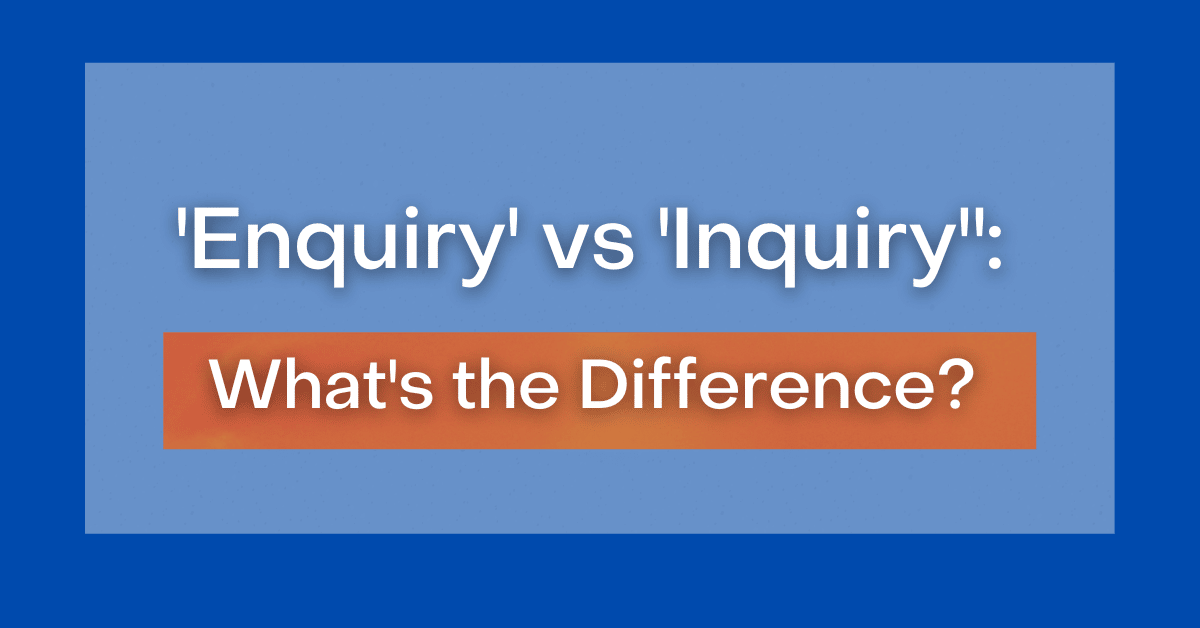In the quest for knowledge, the terms "inquire" and "enquiry" often surface, creating a subtle yet significant distinction that many may overlook. While these words are used interchangeably in casual conversation, their usage can vary based on geographical and contextual factors. Understanding when to use each term can enhance your communication skills, particularly in formal writing or professional settings. As we delve into the depths of these words, we will uncover their meanings, the contexts in which they thrive, and how they shape our quest for information.
In a world driven by information, knowing how to properly inquire or make an enquiry is crucial. Whether you're reaching out for customer service, conducting academic research, or simply trying to clarify a point in a conversation, the way you frame your questions can have a profound impact on the responses you receive. This article aims to demystify the nuances between "inquire" and "enquiry," offering clarity on when to use each word to ensure effective communication.
Furthermore, the distinction between "inquire" and "enquiry" can also reflect regional preferences, particularly between American and British English. Understanding these differences is key for anyone looking to communicate effectively across cultures. Join us as we explore these terms in depth through various angles, providing insights and tips that will enhance your linguistic proficiency.
What is the Meaning of Inquire?
The term "inquire" is primarily used as a verb, meaning to seek information by asking a question. It is often associated with a more formal context, such as legal or official matters. For instance, if you were to inquire about a job opening at a company, you would be formally asking for information regarding the possibility of employment.
What does Enquiry Mean?
On the other hand, "enquiry" is a noun that refers to the act of asking for information. This term is commonly used in British English and can often be found in contexts like customer service or academic research. For example, a student may submit an enquiry to their professor regarding their research paper.
Are Inquire and Enquiry Interchangeable?
While "inquire" and "enquiry" may seem interchangeable, they are not always used in the same contexts. In American English, "inquire" is favored, while "enquiry" is more prevalent in British English. This difference can lead to confusion, particularly for those who communicate across these regions.
How to Use Inquire and Enquiry in a Sentence?
To effectively use these terms in your writing, consider the following guidelines:
- Use "inquire" when you are performing the action of asking for information.
- Use "enquiry" when referring to the actual request or process of asking.
- Remember the regional preferences: "inquire" in American English and "enquiry" in British English.
Can You Provide Examples of Inquire and Enquiry?
Certainly! Here are some examples that illustrate the proper use of these terms:
- Inquire: “I would like to inquire about the availability of rooms at your hotel.”
- Enquiry: “I submitted an enquiry regarding the hotel’s cancellation policy.”
What Are the Synonyms of Inquire or Enquiry?
Understanding synonyms can also enhance your vocabulary. Here are some synonyms for "inquire" and "enquiry":
- Ask
- Question
- Probe
- Investigate
- Query
When Should You Use Inquire or Enquiry in Formal Writing?
In formal writing, it is essential to maintain clarity and precision. Here are some tips on when to use "inquire" or "enquiry":
- Choose "inquire" when you are actively asking for information.
- Opt for "enquiry" when referring to the subject of your inquiry.
- Be mindful of your audience and regional preferences to ensure effective communication.
What Are Common Mistakes Made with Inquire and Enquiry?
Some common mistakes include:
- Using "enquire" in American English, where "inquire" is preferred.
- Confusing the two terms in casual conversation.
- Neglecting to consider the formality of the context when choosing which term to use.
Conclusion: Why Understanding Inquire and Enquiry Matters?
In conclusion, understanding the difference between "inquire" and "enquiry" is essential for effective communication. By recognizing their meanings, usages, and regional preferences, you can enhance your proficiency in the English language. Whether you are in a formal setting or a casual conversation, being mindful of how you frame your questions can lead to clearer, more effective exchanges of information. So, the next time you find yourself needing to inquire or make an enquiry, remember the nuances that set these terms apart.
You Might Also Like
Unleashing The Thrill Of Great JDM CarsUnraveling The Mystery Of The Phone Pound Sign
The Enigmatic Durin Family Tree: A Journey Through Dwarven Heritage
Coffee Shop Ideas: Brewing Success In The Café Culture
Exploring The World Of Pretty Porn Actresses
Article Recommendations
- Tyler Hynes Wife
- Does Tulsi Gabbard Have Children
- Diddy And Justin Bieber
- Tim Miller Husband Tyler Jameson
- Liam Payne Mission San Jose
- Jesse Watters Wife
- Lightskin Bbw
- Simon Cowell News
- When Did Alex Wagner Get Married
- Nina Ian


